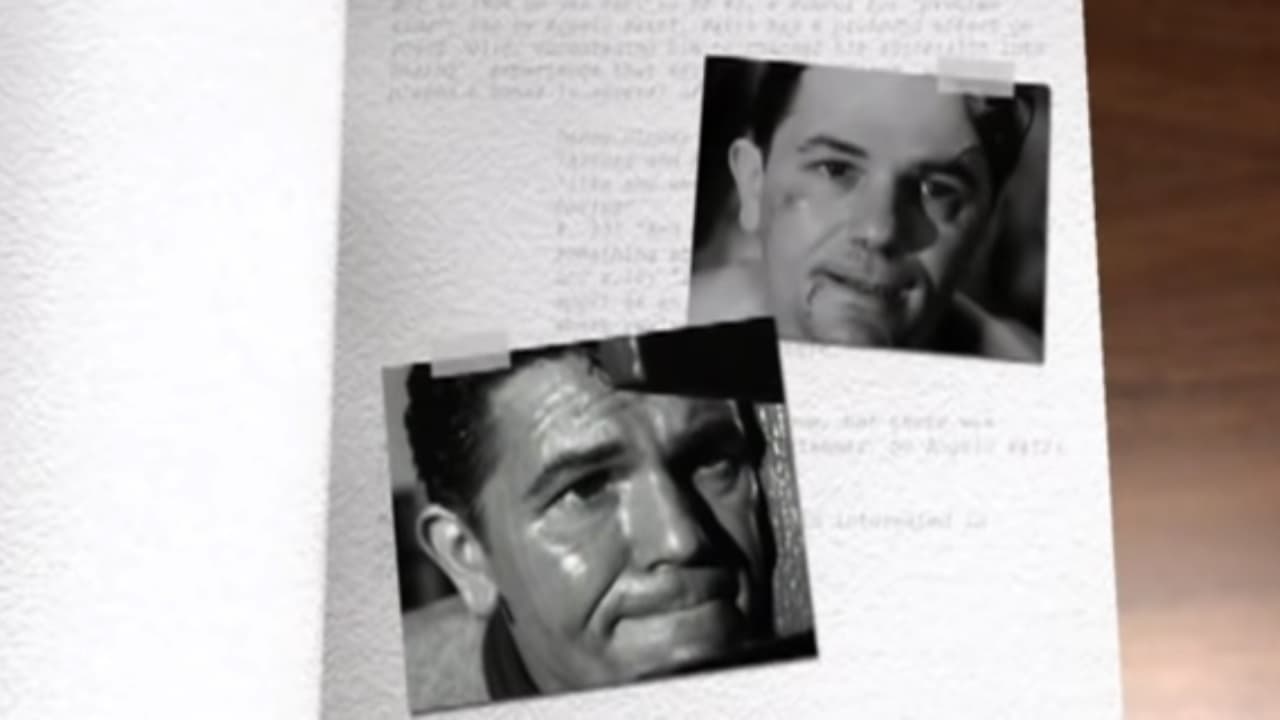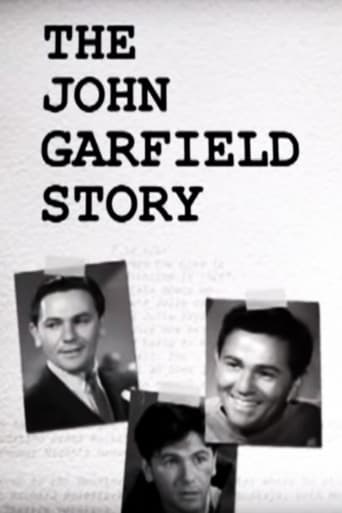

Wow! Such a good movie.
... View MoreStory: It's very simple but honestly that is fine.
... View MoreThere are moments in this movie where the great movie it could've been peek out... They're fleeting, here, but they're worth savoring, and they happen often enough to make it worth your while.
... View MoreWorth seeing just to witness how winsome it is.
... View MoreMy impression of John Garfield had always been that of a 1940s actor who played tough guy roles, and who grew up in a rough urban neighborhood. I tended to think of him mostly in the role of a boxer, rather short and stocky (his stated height is exactly the same as that of Tom Cruise). But since Garfield was before my time, my image of him was vague.This one-hour bio put the man's life in sharper focus for me. I didn't know he played a variety of character types or that he studied method acting and spent much of his career affiliated with NYC's theater company. These factual details helped clarify my perception, though they also reinforced my image of him as a tough guy.The bio includes interviews with current film VIPs, and is narrated by his daughter. Not unexpectedly these people gush with flowery compliments and adulation for Garfield. Has there ever been a film bio that featured interviewers critical of the deceased? In "The John Garfield Story" the interview responses thus seem overly eulogistic. However much the anticommunist HUAC may have wrongly hounded Garfield, the Committee didn't "kill" Garfield as one interviewer says flat out.Even so, though the film may be a standard celebrity bio, it is still an interesting story, because Garfield himself was an interesting man and a fine actor.
... View MoreThis is a biography of John Garfield that was made by Turner Entertainment. It talks about the life and career of John Garfield. It also, towards the end, talks about his problems during the Red Scare, as his left-wing politics were an excuse to hound him about communism. The film consisted of many interviews--most notably his youngest daughter--who really didn't know her father that well, as she was awfully young when he died at age 39. What a loss.The film was well-made and entertaining. Interesting and filled with many interesting facts and anecdotes. My only complaint, and it's a small one, is that the film was so short. But, so was his life...so perhaps this is fitting.By the way, if you wonder about Garfield's wife, she was alive in 2003 when the film came out but was suffering from Alzheimers--so she really was not available to participate in the film. She died a year later.
... View More"The John Garfield Story" is a good look at an actor who died very young and under the cloud of the blacklist. The sections concerning the actor's personal life were most interesting to me, since I knew very little about it. Garfield's story is narrated by his daughter, the actress/teacher Julie Garfield. There was another daughter who died from a massive allergy attack as a child.The documentary covers Garfield's early days as Jacob Garfinkle, whom his family called Julie and who later billed himself as Jules, and how at a school for problem kids his dramatic and boxing skills were honed with the help of the head of the school. It goes into his early theater work, and how he took a contract at Warners after losing out to Luther Adler as "Golden Boy," a play specifically written for him by Clifford Odets. He was evidently considered too green for the role by the Group Theater and actually didn't play the lead until 1952, when his Hollywood career was over.Garfield's star rose quickly - he was a handsome tough guy who gave honest performances and was rewarded with some major films, including "The Postman Always Rings Twice," "Gentlemen's Agreement," and "Humoresque." And his star fell just as fast when the Communist witch hunt began. A liberal in his views, and one who consorted with writers, actors, and directors deemed questionable, his major sin was going to Yugoslavia during the war. He was unable to enlist because of a bad heart, and instead helped to entertain the troops. (Lee Grant ended up on the blacklist, by the way, because she attended the funeral of someone who was blacklisted.) When he was subpoenaed for the hearings and refused to name names, the last nail went into his coffin. His last film was a B picture, "He Ran All the Way." I can't agree totally with one of the posters, who claims that Garfield would have been washed up anyway. Yes, it's true, the '50s were filled with costume dramas and musicals; they were also filled with angry young men for whom he was the prototype - James Dean, Marlon Brando, Rod Steiger, and Paul Newman, to name a few - and surely Garfield could have successfully continued to work in and produce movies. The stage would have gotten him through the harder-to-cast middle-aged years until "The Godfather," and there's no doubt his later career as a character actor would have been very rich. But there's no use speculating.If you don't know much about Garfield - and I didn't - you will find this a fascinating look at his career and life. But watch a little more closely, and you'll realize also that he was undoubtedly a lot more complicated than this documentary shows.
... View MoreNarrated by his daughter Julie, this film offers the standard take on John Garfield: great actor, social activist, victim of HUAC. Clips from many of his performances are shown, including some we don't see every day on TCM. Pretty much an adoring portrait, although there are a few references to Garfield's darker side. Was he a great actor? He was always quite good, but he had his limitations. He was generally better in film noir than the great outdoors and often stronger in supporting roles than in leads. The film makes an argument that Warner's frequently misused him, but he was hardly unique in this regard. In any case, he did some of his best work there (e.g.,"Pride of the Marines") before free lancing in the late 40s. Was he an activist? Yes, though not any more so than a number of people and probably less than some. His roots may have been in the Group Theater, but even there the real emphasis was on acting, not activism. The film doesn't spend too much time on this side of his life, which is just as well, though the leftist actors who are interviewed clearly warm to this theme and to the concept of his martyrdom. For all the talk about HUAC and blacklisting (Joe Bernard states flatly "the Committee killed him"), Garfield's acting career was at most only half dead when he died at 39. He'd just been on Broadway in "Golden Boy" and surely could have made a good living on the stage, which was always his first love. As for his film career, that was probably on the skids anyway by 1952. Noir and social realism were played out. Hollywood was entering a white bread era and Garfield's urban/ethnic grittiness didn't fit into a landscape dominated by Westerns, Biblical epics, Technicolor musicals, and romantic comedies. Had he lived he surely would have made a big comeback in the 60s and 70s. It's not hard to imagine him as Sol Nazerman or Hyman Roth, but it wasn't in the cards. In his last film, titled ironically "He Ran All the Way", he was allowed very little running. Rheumatic fever in the early 30s had damaged his heart and there may have been congenital problems as well (his son died of a heart attack at 41). Very likely he had been dying for years. Recommended primarily for Garfield's fans or for those completely unacquainted with his work. Others will find it little more than routine.
... View More